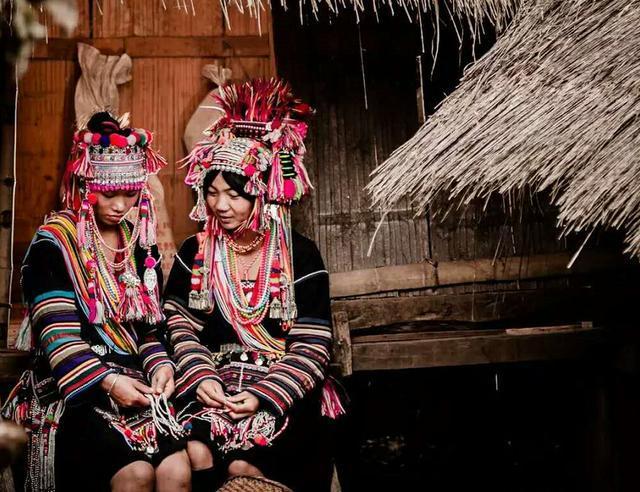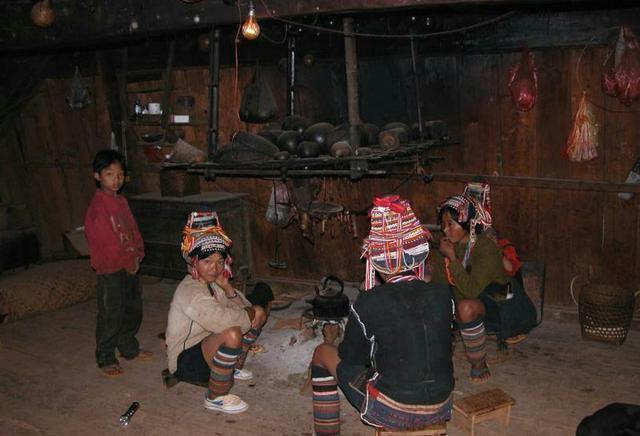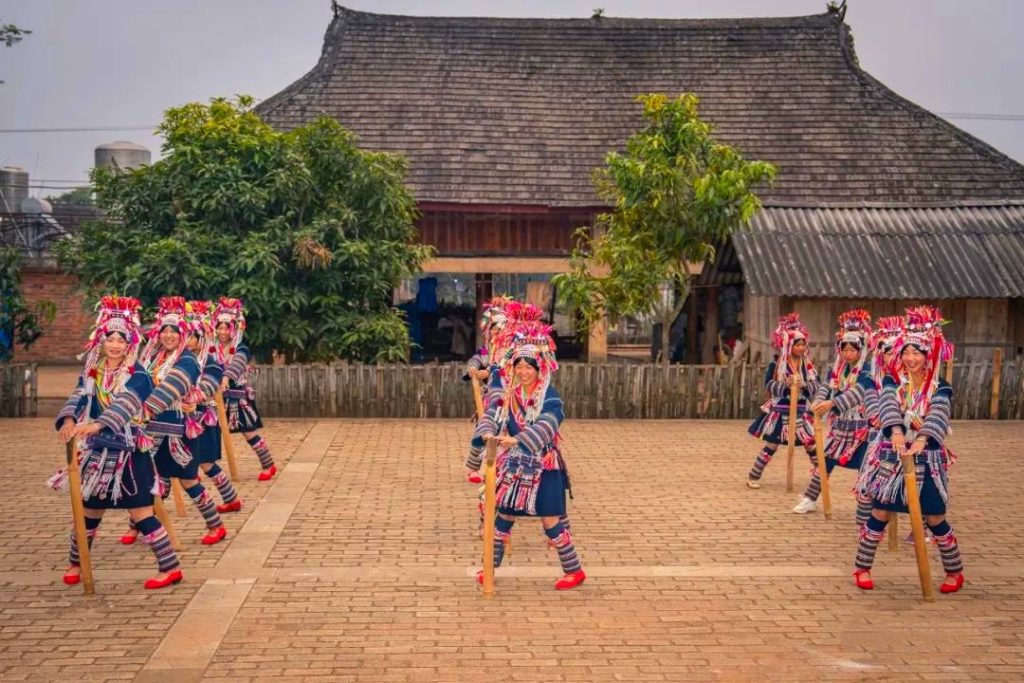Mangjiu Xinzhai Village of Mangxin Town in Menglian County, Puer
Chinese Name: Mangjiu Xinzhai Village of Mangxin Town in Menglian County, Puer
English Name:普洱市孟连县芒信镇海东村委会芒旧新寨
Mangjiu Xinzhai Village (芒旧新寨) in Mangxin Town (芒信镇), Menglian County (孟连县), is not just a village but a journey into the heart of Yunnan Province‘s unique ethnic cultures. The village is situated in the southwest of Yunnan, close to the China-Myanmar border, making it a culturally rich location where local traditions blend with the natural beauty of the region. With the Akha people’s distinct lifestyle, architecture, and attire, it offers a rare and immersive experience for visitors looking to explore untouched ethnic communities.
History and Cultural Heritage
Mangjiu Xinzhai’s Akha people (阿卡人), a subgroup of the Hani ethnic group (哈尼族), hold a profound cultural heritage passed down through generations. The village is an isolated community with limited interaction with modern society, allowing the Akha to preserve their traditional way of life. One of the most distinctive aspects of the Akha culture is their intricate clothing, weaving traditions, and spiritual practices.
Akha Headgear: The “尖头阿卡” (Pointed Akha) is a sub-group of the Akha people known for their unique headgear made from rattan or reed. The headgear stands taller than the head, which is why it is called “pointed” (尖头). The traditional headpiece is an important part of their identity and cultural expression.
Spirituality and Daily Life: The Akha are deeply spiritual and practice animism, believing that spirits inhabit both the natural world and man-made objects. This belief is reflected in their lifestyle, where many daily rituals are connected to the spirits, such as offerings during harvests and during festive occasions.
Architectural Features
The houses in Mangjiu Xinzhai are a representation of the Akha people’s connection with nature. The architecture is humble but deeply functional:
Bamboo Stilt Houses: The Akha people’s homes are often constructed on bamboo stilts. This elevates the structure, protecting it from flooding and offering better ventilation in the hot summer months.
Thatch and Mud Walls: The walls are made from mud, while the roofs are covered with thatch, making them blend perfectly into the forested environment.
Simple Interiors: The interiors are sparse, with earthen floors and wooden furniture. There are no modern conveniences, and life in the village is basic but functional.
The village is filled with bamboo fences and houses draped in dyed cloths, giving it a rustic charm. The colorful traditional clothing worn by the villagers further enhances the visual beauty of the village, creating a scene that feels like stepping into a time capsule.
The Role of Women in Akha Society
Matriarchal Influence: While the Akha are often thought of as a matrilineal society, this doesn’t mean that women are the sole decision-makers. In Mangjiu Xinzhai, the role of women is highly respected as they handle the bulk of the household chores, farming, and day-to-day activities. However, men still have the final say in community and familial matters.
Labor and Family Roles: Women are also responsible for planting and harvesting crops, gathering firewood, and even making the traditional garments worn by the villagers. The Akha women have maintained their traditional way of life despite the rapid modernization of other regions.
Women’s Dress: Akha women wear vibrant clothing, such as sleeveless tops, knee-length skirts, and intricately embroidered waistbands. Their attire often incorporates shells, beads, and colorful embroidery, which not only reflect beauty but also serve as important cultural symbols.
Traditional Festivals
The people of Mangjiu Xinzhai celebrate numerous festivals throughout the year. The most prominent festival is the Gatangpa Festival (嘎汤帕节), a New Year celebration, which is held every January. During this time, villagers engage in activities such as:
Ancestor Worship: Offerings are made to their ancestors to bless the family and village for the coming year.
Bamboo Pole Dance: This dance is a traditional ritual and celebration during the Gatangpa Festival, where men and women dance together using bamboo poles, symbolizing unity and strength.
Additionally, there are over 20 agricultural festivals celebrated in Mangjiu Xinzhai, which celebrate various aspects of life such as rice planting, harvests, and the changing seasons. These festivals are characterized by:
Song and Dance: Traditional songs and dances are performed, representing the deep connection to the land and the harvest.
Swinging: During certain festivals, villagers use large swings to entertain themselves and celebrate the harvest.
Agriculture and Economic Life
The Akha people live primarily off the land. Their traditional economy is centered around subsistence farming. The main crops include rice, corn, and sugarcane. In 2006, the total income from agriculture was 33,000 CNY, and the village’s economy was heavily reliant on the cultivation of these crops.
Sugarcane: A key crop in Mangjiu Xinzhai, sugarcane is a major agricultural product, with the local economy seeing a shift towards larger-scale sugar production and a focus on the sugarcane industry as part of the regional development plan.
Tea: The village also produces tea and is working on upgrading its tea industry by improving the quality of tea gardens and increasing production.
Infrastructure and Development
In terms of infrastructure, Mangjiu Xinzhai was historically quite isolated, but road access and communication networks have improved over the years.
Road Improvements: By 2023, all natural villages, including Mangjiu Xinzhai, were connected to paved roads, making access to the village easier. Previously, the village was accessible only via dirt roads.
Communication: The village has limited access to telecommunication services, although there have been improvements to communication networks in recent years.
Sustainable Development and Future Plans
Economic Development Plans: The local government has prioritized the growth of the sugarcane and tea industries in the area. The 14th Five-Year Plan of Menglian County includes a targeted sugarcane industry output of 10.7 billion CNY by 2025.
Tourism: With its unique ethnic culture and natural beauty, Mangjiu Xinzhai has started to attract cultural tourists who are eager to experience traditional Akha culture, while supporting local economic development.
Visitor Experience
For those who wish to immerse themselves in Akha culture, Mangjiu Xinzhai offers a unique and authentic experience. Visitors can take part in traditional activities, including:
Clothing Making: Learn how the Akha make their traditional garments.
Cultural Performances: Watch performances of bamboo pole dancing and song and dance during local festivals.
Photography: Capture the beauty of the landscape, traditional homes, and vibrant clothing. The village is a photographer’s paradise, with its strikingly beautiful natural scenery and rich cultural details.
Practical Information for Travelers
Transportation: The village is approximately 1 hour’s drive from Menglian County (孟连县), and the roads have greatly improved in recent years.
Local Products: Visitors can purchase local products such as sugarcane, tea, and handicrafts from the village cooperative.
Cultural Etiquette: Visitors are encouraged to respect the Akha people’s traditional customs. It is also recommended to confirm the dates of festivals and events in advance if you wish to participate.
Development and Future Prospects
Traffic Improvements:
The upcoming Ruili to Menglian Expressway (瑞丽至孟连高速), scheduled to open in 2024, will significantly enhance access to the region.
Agricultural Industry:
Menglian County is focused on expanding its sugarcane and tea industries, with plans to reach a 10.7 billion CNY output value from the sugar industry by the end of the 14th Five-Year Plan (2021-2025).
Visiting Mangjiu Xinzhai Village
Best Time to Visit:
The village is open to visitors year-round. However, the most vibrant times are during traditional festivals such as the Gatangpa Festival (嘎汤帕节) in January, which offers a deeper look into local customs and celebrations.
How to Get There:
By Car: The village is approximately a 1-hour drive from Menglian County (孟连县), with improved road conditions making it more accessible.
Products and Souvenirs:
Visitors can purchase sugarcane, tea, and other locally produced agricultural goods from the village cooperative.
Important Considerations:
Cultural Respect: It’s important to respect the Akha people’s customs and traditions. If you wish to participate in festivals or cultural activities, be sure to confirm the dates and times in advance.
Chinese Version: https://baijiahao.baidu.com/s?id=1611295135245105650&wfr=spider&for=pc

 7 Days GolfingTour
7 Days GolfingTour
 8 Days Group Tour
8 Days Group Tour
 8 Days Yunnan Tour
8 Days Yunnan Tour
 7 Days Shangri La Hiking
7 Days Shangri La Hiking
 11 Days Yunnan Tour
11 Days Yunnan Tour
 6 Days Yuanyang Terraces
6 Days Yuanyang Terraces
 11 Days Yunnan Tour
11 Days Yunnan Tour
 8 Days South Yunnan
8 Days South Yunnan
 7 Days Tea Tour
7 Days Tea Tour
 8 Days Muslim Tour
8 Days Muslim Tour
 12 Days Self-Driving
12 Days Self-Driving
 4 Days Haba Climbing
4 Days Haba Climbing
 Tiger Leaping Gorge
Tiger Leaping Gorge
 Stone Forest
Stone Forest
 Yunnan-Tibet
Yunnan-Tibet
 Hani Rice Terraces
Hani Rice Terraces
 Kunming
Kunming
 Lijiang
Lijiang
 Shangri-la
Shangri-la
 Dali
Dali
 XishuangBanna
XishuangBanna
 Honghe
Honghe
 Kunming
Kunming
 Lijiang
Lijiang
 Shangri-la
Shangri-la
 Yuanyang Rice Terraces
Yuanyang Rice Terraces
 Nujiang
Nujiang
 XishuangBanna
XishuangBanna
 Spring City Golf
Spring City Golf
 Snow Mountain Golf
Snow Mountain Golf
 Stone Mountain Golf
Stone Mountain Golf















